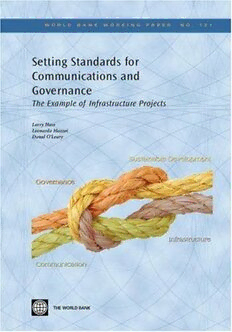Download Setting Standards for Communications and Governance: The Example of Infrastructure Projects (World Bank Working Papers) PDF Free - Full Version
Download Setting Standards for Communications and Governance: The Example of Infrastructure Projects (World Bank Working Papers) by Larry Haas, Leonardo Mazzei, Donal O'Leary in PDF format completely FREE. No registration required, no payment needed. Get instant access to this valuable resource on PDFdrive.to!
About Setting Standards for Communications and Governance: The Example of Infrastructure Projects (World Bank Working Papers)
This title outlines a number of practical initiatives to strengthen the role of development communication in infrastructure projects. The authors aim to facilitate better quality projects and to build consensus on the type of governance reforms needed to fight corruption, drawing on the experience of development agencies like the World Bank and Transparency International. It starts by characterizing corruption vulnerabilities in infrastructure and proceeds to illustrate where communication has added value on a number of recent projects, both in regard to making the projects more sustainable and by incorporating anti-corruption measures into the project preparation and implementation. It draws on examples of mainly World Bank-supported projects from the road, transport, power, and water sectors in different governance contexts. Five standard-setting initiatives are then outlined, which focus on promoting best practice to better integrate development communication into the project cycles of World Bank-supported infrastructure projects.
Detailed Information
| Author: | Larry Haas, Leonardo Mazzei, Donal O'Leary |
|---|---|
| Publication Year: | 2007 |
| ISBN: | 9780821371701 |
| Pages: | 66 |
| Language: | English |
| File Size: | 0.838 |
| Format: | |
| Price: | FREE |
Safe & Secure Download - No registration required
Why Choose PDFdrive for Your Free Setting Standards for Communications and Governance: The Example of Infrastructure Projects (World Bank Working Papers) Download?
- 100% Free: No hidden fees or subscriptions required for one book every day.
- No Registration: Immediate access is available without creating accounts for one book every day.
- Safe and Secure: Clean downloads without malware or viruses
- Multiple Formats: PDF, MOBI, Mpub,... optimized for all devices
- Educational Resource: Supporting knowledge sharing and learning
Frequently Asked Questions
Is it really free to download Setting Standards for Communications and Governance: The Example of Infrastructure Projects (World Bank Working Papers) PDF?
Yes, on https://PDFdrive.to you can download Setting Standards for Communications and Governance: The Example of Infrastructure Projects (World Bank Working Papers) by Larry Haas, Leonardo Mazzei, Donal O'Leary completely free. We don't require any payment, subscription, or registration to access this PDF file. For 3 books every day.
How can I read Setting Standards for Communications and Governance: The Example of Infrastructure Projects (World Bank Working Papers) on my mobile device?
After downloading Setting Standards for Communications and Governance: The Example of Infrastructure Projects (World Bank Working Papers) PDF, you can open it with any PDF reader app on your phone or tablet. We recommend using Adobe Acrobat Reader, Apple Books, or Google Play Books for the best reading experience.
Is this the full version of Setting Standards for Communications and Governance: The Example of Infrastructure Projects (World Bank Working Papers)?
Yes, this is the complete PDF version of Setting Standards for Communications and Governance: The Example of Infrastructure Projects (World Bank Working Papers) by Larry Haas, Leonardo Mazzei, Donal O'Leary. You will be able to read the entire content as in the printed version without missing any pages.
Is it legal to download Setting Standards for Communications and Governance: The Example of Infrastructure Projects (World Bank Working Papers) PDF for free?
https://PDFdrive.to provides links to free educational resources available online. We do not store any files on our servers. Please be aware of copyright laws in your country before downloading.
The materials shared are intended for research, educational, and personal use in accordance with fair use principles.

